|
|
|
Sort Order |
|
|
|
Items / Page
|
|
|
|
|
|
|
| Srl | Item |
| 1 |
ID:
146295
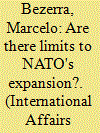

|
|
|
|
|
| Summary/Abstract |
THE EPICENTER of the earthquake that shatters Ukraine is located far beyond its dilemma of economic integration with the European Union or the Eurasian Union headed by Russia. The international dimension of this crisis (about which much has been already said in the post-Soviet epoch) concerns the defense and security issues or, to be more exact, the North Atlantic Treaty Organization's expansion to the east of Europe so that to tip the balance of power with Russia. This time NATO's persistent efforts at the borders of Russia produced two important events - an armed opposition in pro-Russian Donbass and reunification of Crimea with Russia, an event of historic consequence. This means that the project NATO is realizing in Ukraine as part of its security doctrine destabilized European security.
|
|
|
|
|
|
|
|
|
|
|
|
|
|
|
|
| 2 |
ID:
146293
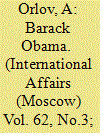

|
|
|
|
|
| Summary/Abstract |
EVERY AMERICAN PRESIDENT wants to make history. Few of them succeeded; most of them simply were not up to the mark; and some made it with a negative mark, to put it mildly. All and every master of the White House wants to be remembered for a long time, if not forever; by the end of the second term, if the head of the American state reaches this phase of political glory at all, the desire becomes an urge. Personal ambitions become inflated in each and every "lame duck" (the absurd or even ridiculing term applied to the president at the end of his presidential career, which means that he has become, to a certain extent, "waste material"). Each and every "lame duck" tries to use the last chance to prove to the Americans, the world community and, in the final analysis, to himself that he was not another faceless pawn in the Oval Office, that his election was not a mistake and that he has formulated a development algorithm for his country or, better still, for the world, that would not be immediately pushed aside by the next administration on the American political Olympus.
|
|
|
|
|
|
|
|
|
|
|
|
|
|
|
|
| 3 |
ID:
146309


|
|
|
|
|
| Summary/Abstract |
THE COLLAPSE of the bipolar system of international relations coincided with the start of successful economic reforms in India, which were launched in 1991 and led to serious discussions on that country's role in the world. India's progress has made the international scholarly community increasingly confident that the nation will become a significant factor in world politics. It is also a wide-scale belief in Indian society. When they express it, Indians prefer to add that their country will regain the status of a center of global civilization that it held for most of its history. However, India's desire to become the regional leader, and ultimately a global power, comes up against some obstacles, both domestic and international.
|
|
|
|
|
|
|
|
|
|
|
|
|
|
|
|
| 4 |
ID:
146306


|
|
|
|
|
| Summary/Abstract |
IN FEBRUARY 2016, Foreign Minister of France Laurent Fabius left his post after nearly four years in office; this rekindled the discussion about France's foreign policy and its steadily declining international significance. When in the late 1950s General de Gaulle presented his foreign policy doctrine to the nation it looked as if there were no alternatives to it. Georges Pompidou, the general's top ally, minced no words: "No French government can pursue a policy different from that of de Gaulle. It might be differently formulated but the essence will remain the same."
|
|
|
|
|
|
|
|
|
|
|
|
|
|
|
|
| 5 |
ID:
146313
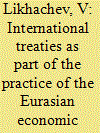

|
|
|
|
|
| Summary/Abstract |
THE EURASIAN ECONOMIC UNION (EAEU) is a new structure, and one with a strategic role in international relations. Its founding treaty of May 29, 2014 defines it as "an international organization for regional integration possessing international legal personality." The principal tasks of the EAEU, whose members are five sovereign and equal states - Armenia, Belarus, Kazakhstan, Kyrgyzstan, and Russia, - are to create conditions for the stable economic development of the member countries in order to raise the living standards of their population; to build common markets for goods, services, capital, and labor; and to ensure efficient cooperation between the member countries' economies, comprehensively modernize them and make them more competitive globally
|
|
|
|
|
|
|
|
|
|
|
|
|
|
|
|
| 6 |
ID:
146311


|
|
|
|
|
| Summary/Abstract |
THE ISLAMIC WORLD, which recently entered the year 1437 (according to the Hijri calendar) of its history, is going through a fundamental crisis, perhaps one of the most acute and fateful crises since the emergence of Islam in the early Middle Ages. This crisis to a very large degree stems from the situation within Islam as such and the deepening disagreements between its various trends and schools. To all appearances, such is the evolutionary development logic of all monotheistic world religions, for example, Christianity, which passed through a period of religious "renaissance" and the crucible of inquisition, and finally found its balanced place in the life of human civilization.
|
|
|
|
|
|
|
|
|
|
|
|
|
|
|
|
| 7 |
ID:
146308


|
|
|
|
|
| Summary/Abstract |
SET UP IN 1948, Israel a year later was officially recognized by Turkey that became its closest partner in the Middle East, the region swept by the Arab wars of independence in which Turkey was the only pro-Western state. In 1954, Gamal Abdel Nasser explained that "Turkey, because of its Israeli policy, is disliked in the Arab world." At that time, their ties were mostly symbolic.1
|
|
|
|
|
|
|
|
|
|
|
|
|
|
|
|
| 8 |
ID:
146310
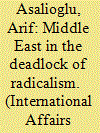

|
|
|
|
|
| Summary/Abstract |
RADICAL GROUPS have always exploited, and continue to exploit, religion, ethnicity, ideology, and lack of education to sustain their influence. Radicalism deforms social environments in which it emerges. As a result, radical terrorist organizations existing in a specific society interact not only with one another. They do not only create their own social base but help build the social base for a political opposition, thereby setting off significant social transformations. Studies by the Pew Research Center show that radicalization and extremism, including the activities of al-Qaeda, Hamas and Hezbollah, caused more concern in the Middle East in 2014 than in 2013, that there is particularly strong concern in Turkey, and that extremism is a source of worry for the majority of Middle Eastern nations.
|
|
|
|
|
|
|
|
|
|
|
|
|
|
|
|
| 9 |
ID:
146305
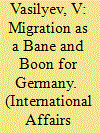

|
|
|
|
|
| Summary/Abstract |
THE MASSIVE FLOW of refugees and migrants into Europe is a problem of political, humanitarian, social, demographical, and economic dimensions. How did Germany come to be seen as the Promised Land by the majority of migrants? History provides answers. First of all, there was postwar resettlement of ethnic Germans ousted from East Prussia, with 7.8 million moving to West Germany and 2.9 million to East Germany in the 1950s. Then, between 1955 and 1973, West Germany's "economic miracle" produced tremendous demand for low-skilled labor. To attract guest workers, West Germany signed agreements with Spain and Greece in 1960, Turkey in 1961, Morocco in 1963, Portugal in 1964, Tunisia in 1965, and Yugoslavia in 1968. Guest workers from those countries made a tangible contribution to West German prosperity. The oil crisis of 1973 forced West Germany to slash its imports of labor. While 870,000 guest workers arrived in Germany in 1973, only 370,000 did in 1975. Economists labeled this a "consolidation phase."
|
|
|
|
|
|
|
|
|
|
|
|
|
|
|
|
| 10 |
ID:
146292
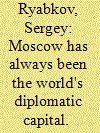

|
|
|
|
|
| Summary/Abstract |
Armen Oganesyan, Editor-in-Chief of International Affairs: Sergey Alekseyevich, recently, two foreign service chiefs - U.S. Secretary of State John Kerry and German Foreign Minister Frank-Walter Steinmeier - visited Moscow. I would like to ask you about the outcome of the talks with them. Some experts say: "A thaw has set in. " Others, including members of our expert club, are more skeptical. Maybe the truth lies somewhere in between?
|
|
|
|
|
|
|
|
|
|
|
|
|
|
|
|
| 11 |
ID:
146300
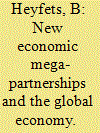

|
|
|
|
|
| Summary/Abstract |
ON FEBRUARY 4, 2016, in Auckland, heads of 12 Pacific Rim states signed a treaty on the Trans-Pacific Partnership (TPP), the first trans-regional mega-partnership, which will come into force in the next two years as soon as at least six countries, representing about 85% of the total GDP of the TPP, have ratified it.
|
|
|
|
|
|
|
|
|
|
|
|
|
|
|
|
| 12 |
ID:
146302


|
|
|
|
|
| Summary/Abstract |
Author: K. Dolgov
TODAY'S INTERNATIONAL RELATIONS are characterized by mounting unpredictability and instability and the rapidly growing risks of deepening inter-civilizational, intercultural and interreligious divides. A number of experts on international issues note that there is reason to talk about a global crisis of religious freedoms. In substantiation of this, they refer to the sad statistics of Christianophobia that, according to human rights advocates, exists in 139 countries. Islamophobia exists in 121 countries. The level of anti-Semitism in the world shows no signs of abating. On the contrary, in recent years, the situation has deteriorated everywhere. And most disturbingly, the understanding that respect for religion and religious freedoms is critical for the normal development and prosperity of human communities seems to be weakening in the world at large, in particular in Europe and the United States.
|
|
|
|
|
|
|
|
|
|
|
|
|
|
|
|
| 13 |
ID:
146314


|
|
|
|
|
| Summary/Abstract |
The book Statehood: National Idea of Belarus* is not only about Belarus, our closest ally. Despite all the ambiguities involved in the assessment of its development, many experts agree that it has become a unique, sufficiently stable and socially-oriented state. It seems important that the above collection of studies by renowned researchers and political analysts from Austria, Belarus, Belgium, France, Italy, Russia, the United States, and various other countries, views Belarus from different perspectives. The selection of authors was based on the following principle: All of them, regardless of whether they are Belarus' nationals or not, visited the country at different stages of its development and have firsthand knowledge of the processes unfolding there.
|
|
|
|
|
|
|
|
|
|
|
|
|
|
|
|
| 14 |
ID:
146298
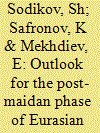

|
|
|
|
|
| Summary/Abstract |
EXPERTS increasingly often use maidan, the Persian for "open field," as the key word in describing today's geopolitical situation in Eurasia. The conflict in Ukraine has affected the geopolitical configurations in Central Asia, and has created new obstacles and challenges to the Eurasian integration project, a large-scale plan to build an economic alliance of Russia and several other former Soviet republics.
|
|
|
|
|
|
|
|
|
|
|
|
|
|
|
|
| 15 |
ID:
146307
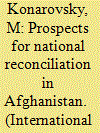

|
|
|
|
|
| Summary/Abstract |
THE TIME that has passed since most of the Western military contingent was withdrawn from Afghanistan has not led to the materialization of the weak hope for the government's ability to meet the formidable challenges involved in stabilizing the situation and peace-building in the country, including on the basis of dialogue with the armed opposition. Extreme instability will most likely predetermine the internal situation in Afghanistan also in the foreseeable future. After more than the decade-long active presence of foreign troops in Afghanistan, as well as massive external financial and economic infusions, the country continues to be associated with the concept of a "failed state," continuing to be affected by ethnic and religious fragmentation and medieval prejudices. The failure of Washington's mission in Afghanistan was evidenced by its inability to deliver a decisive blow either to al-Qaeda or the Taliban.
|
|
|
|
|
|
|
|
|
|
|
|
|
|
|
|
| 16 |
ID:
146296


|
|
|
|
|
| Summary/Abstract |
THE FACT that since September 28, 2015, when President Putin delivered his historic speech at the UN General Assembly in New York, the situation in the Middle East has radically changed is self-evident and requires no additional arguments. This was accomplished by Russia that not merely called on the world to set up a united antiterrorist front but confirmed by its actions that it was prepared to fight "the cancer," i.e., ISIS, consistently and efficiently.
|
|
|
|
|
|
|
|
|
|
|
|
|
|
|
|
| 17 |
ID:
146301
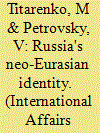

|
|
|
|
|
| Summary/Abstract |
RUSSIA'S STRATEGIC TURN to the East has revived the academic and social-political discussion about our country's Eurasian self-determination and an adequate understanding of its Eurasian identity. It seems, however, that we have not yet grasped the true philosophical, geoeco-nomic and geopolitical significance of Russian Eurasianism; we should arrive at its comprehensive understanding and formulate its definition.
|
|
|
|
|
|
|
|
|
|
|
|
|
|
|
|
| 18 |
ID:
146297


|
|
|
|
|
| Summary/Abstract |
IN THE PAST FEW MONTHS of 2015, political analysts within and beyond Russia actively discussed its pivot to Asia, specifically, whether such rebalancing of interests was justified or not and whether the great expectations corresponded to the results of Russia's Realpolitik. A larger part of discussions centered on Russia's major Asian partner - China.
|
|
|
|
|
|
|
|
|
|
|
|
|
|
|
|
| 19 |
ID:
146304


|
|
|
|
|
| Summary/Abstract |
IN THIS ERA of global political, economic and information transformations, public diplomacy holds an increasingly strong position as an effective form of international political activity. Due to technological progress, domestic and foreign policy is itself becoming a public field of activity, "a new genre of government in the age of information."
|
|
|
|
|
|
|
|
|
|
|
|
|
|
|
|
| 20 |
ID:
146312


|
|
|
|
|
| Summary/Abstract |
The Saudis believe that this is the safest and only method to deal with the highly unstable regional neighbors steeped in contradictions. This explains why they paved the roads for the United States, their ally of long standing. In the majority of cases, Saudi Arabia allowed Washington to capture the initiative and pursue its own interests in the Middle East and accepted this.
|
|
|
|
|
|
|
|
|
|
|
|
|
|
|
|
|
|
|
|
|